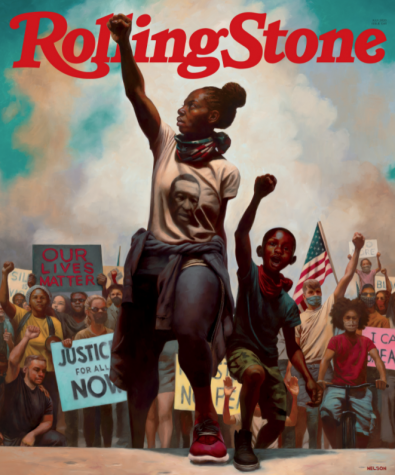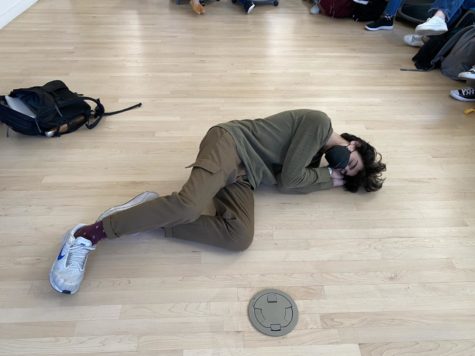In Response to Colin Kaepernick’s Book: The Dehumanization of Black Women
Colin Kaepernick’s book is getting tons of backlash… and it hasn’t even been published yet.
Interestingly enough, much of the hate that “Abolition for the People: The Movement for a Future Without Policing and Prisons” has received isn’t due to the controversial subjects Kaepernick addresses, such as the abolition of the police and the closing of prisons. It is, however, a response to the illustration of a Black woman on the cover championing for criminal justice reform.
To most, there’s nothing particularly striking about the cover art, other than the fact that the artist clearly needs to relearn how to draw anatomy (Seriously, why is the right hand twisted like that?). However, for Black women, specifically dark skin Black women, this is yet another addition to the misogynoir they have faced since childhood.
There’s nothing wrong with Black women fighting for a cause for which they are passionate. In fact, Black Lives Matter was started by three Black women. The thing is, Black women are consistently used to be the face of social justice to the point where it is getting problematic.
Take a look at another controversial magazine cover made by the Rolling Stones magazine in their edition regarding the protests that occurred in response to George Floyd’s death:
What a surprise! Another dark skin Black woman is depicted stepping up as leader and fighting for social justice. There’s a Black male next to her this time. Oh wait, he’s a child. And where is the father? It looks like we have another depiction of the “single mama” trope on our hands too. Great, two birds hit with one stone. Two stereotypes in one.
And once again, there is nothing wrong with Black women fighting for justice. If you are a Black woman and you want to fight for a cause, feel free to do so. But, what many fail to realize is that these illustrations, like many others, reinforce the notion that Black women must always be at the forefront of change. This leads to society constantly forcing Black women into the roles of protecting others, with nobody to protect them.
You’ve probably heard of the “strong Black woman” trope. She’s hard-working, assertive, and self-sacrificing. She doesn’t need support from anyone. She insists on doing everything herself. Though some may believe this is empowering to Black women (They’re so strong and independent, yipee!), these stereotypes are rooted in slavery and are used to justify the mistreatment of Black women.
What was used to justify the slavery of Black women? “Black women are strong. They don’t feel pain.”
What was used to justify the unjust use of Black women for medical research? “Black women are strong. They don’t feel pain.”
The “strong Black woman” can also be thought of as an umbrella term for many other stereotypes and labels placed on them. There is “the Mammy”: the asexual Black woman, incapable of being loved and whose sole purpose to care for the children of her white counterparts. There is “the single mama”: the Black woman deemed romantically undesirable by society and is left to take on the burden of parenthood alone. There is the dreaded “angry Black woman” stereotype, which stems from the idea that Black women are aggressive, loud and masculine, unlike the “feminine and angelic” white woman.
The consistent theme within these stereotypes is that Black women aren’t in need of protection or support; they can handle everything themselves.
These stereotypes were used in cruel attempts to justify the oppression of Black women, and continue to put them in danger today. They even cost them their lives.
There is an urgent crisis of violence of Black femicide occuring. Each day more and more Black women have gone missing. They are often victims of domestic violence. The biases show in the medical field as well, as Black women disproportionately die in childbirth. Lasting stereotypes regarding Black women—their supposed superhuman strength and inability to feel pain—have them frequently denied medical treatment.
Not only do these stereotypes threaten their physical health, the mental health of Black women is often in jeopardy as well. Black women are often pressured to remain “strong and independent”, rarely seeking mental health care, despite alarming rates of depression.
The purpose of this article is not to discourage Black women from stepping up and fighting for what they believe in. However, it is a critique on those who always expect Black women to step up and fight on the frontlines, while never stepping up to fight for them.
Despite pleas from Black women to acknowledge the issue with his book’s cover art, Kaepernick has pinned the illustration to the top of his Twitter feed. He has yet to address any of the controversy surrounding it.
Kaepernick, come out of whatever hiding spot you’re in and address the elephant in the room.
To readers of this article, I urge you to check up on your Black female counterparts and provide a safe space for them to be vulnerable.










